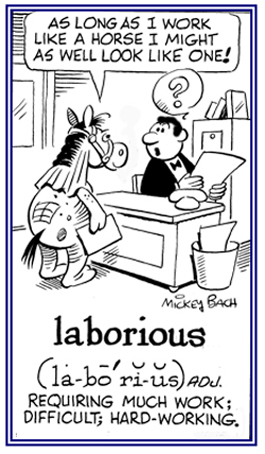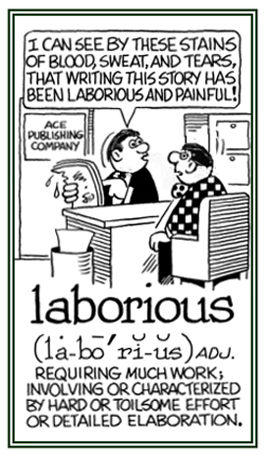labor-, laborat-
(Latin: work, toil)
Motto of Lincoln University, Jefferson City, Missouri, USA.
The title applies to professional workers across a spectrum of educational levels.
2. A room or place with appropriate equipment for teaching science or doing scientific work.
3. A place where drugs and chemicals are manufactured, examined, and tested.
4. A place equipped for performing experimental work or investigative procedures, for the preparation of drugs, chemicals, etc.
5. A region (geographic, etc.) resembling a laboratory inasmuch as it offers opportunities for observation, practice, and experimentation.
6. Any place, situation, set of conditions, or the like, conducive to experimentation, investigation, observation, etc.; anything suggestive of a scientific laboratory.
7. Etymology: Although "laboratory" looks very much like the Latin laboratorium, "a place to labor, a work place"; the word "laboratory" came from the extended Latin elaborare, "to work out", as a problem, and "with great pains"; as evidenced by the Old English spelling "elaboratory"; designating "a place where learned effort was applied to the solution of scientific problems".
It should be noted that such an etymological perspective could not be found in any other dictionary. In fact, other sources state the following similar information: from 1605, "a building set apart for scientific experiments", from Middle Latin laboratorium, "a place for labor or work"; from Latin laboratus, past participle form of laborare, "to work". The shortened form lab was first attested in 1895.
2. Lacking natural ease and grace: "He was a speaker who made many unnecessary labored repetitions and hesitations."
3. Exhibiting a great deal of effort; lacking grace, fluency, or spontaneity.
2. Anyone who works with his/her hands, and so, who is engaged in manual labor.
Technological progress has lead to an increasing segment of manual labor requiring more training or even theoretical insight because it generally includes the use of machinery which includes more training for effective producion.
2. Exerting one's powers of body or mind; especially, with painful or strenuous effort.
3. Moving with great effort: "The truck labored up the hill."
4. To be laboring during the birth of a child, or children.
5. Suffering from some disadvantage or distress; such as, laboring under considerable stress.
2. A reference to requiring long, hard work: William spent many laborious hours on the construction project and it is still not completed.


Go to this Word A Day Revisited Index
so you can see more of Mickey Bach's cartoons.
2. Involving or characterized by hard or toilsome effort.
2. When written in the lower case, "laborite" refers to a member or supporter of a labor union or a labor movement.
Motto of the Brooklyn College (City University of New York), Brooklyn, New York, USA. It is also translated as, "Nothing without great toil."
Motto of Dover College, U.K.
Motto of Rugby School, U.K.


